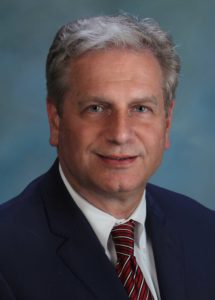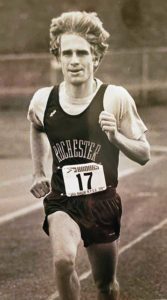Running with John Zabrodsky ’82
Running with John Zabrodsky ’82
Alumnus and former Rochester athlete talks the impact of running on his life and why he helped establish the Timothy G. Hale Endowment for Competitive Excellence

John Zabrodsky ’82
As a college student, John Zabrodsky ’82—a chemical engineering major—spent a lot of time running around. Literally. His always-full schedule of classes focused on materials and engineering principles, labs, and internships. Much the rest of his time was spent on both the cross country and track teams. Zabrodsky loved running, being a part of those teams, and being coached by Tim Hale.
A few years ago, Zabrodsky started rallying former teammates with an idea—to establish the Timothy G. Hale Endowment for Competitive Excellence as a way to honor a man who influenced so many lives. Now established, the fund honors Coach Hale’s legacy while providing programmatic support—in perpetuity—for both the track and field and cross country teams. The Athletics department uses it to build upon a tradition of excellence within these programs and to support the opportunity for our athletes to compete against high-level competition at meets such as the Penn Relays, Raleigh Relays, and the Colonial Relays.
“Coach Hale helped put these running programs on the map and, today, Coach Sam Albert is continuing that legacy,” says Zabrodsky, managing director of Advanced Manufacturing Technology, a Jamestown, N.Y.-based manufacturing systems company that he founded in 1989. “This fund helps the women’s and men’s teams remain competitive and viable.”
Zabrodsky, who was inducted into the Rochester Athletics Hall of Fame in 1999, encourages alumni to get involved. “The more we can collectively contribute to the fund, the more we can do for Rochester’s students,” he adds. “Our combined generosity directly impacts these programs, their future, and the experiences these young athletes will have. I’m sincerely honored to be a part of it.”
Zabrodsky, who has cultivated a love for running among his family members, offers the following insights on this competitive and individual sport.
A family affair
Abby Zabrodsky ’14, ’19S (MBA) ran for the University of Rochester as an undergraduate. Olivia, ran for Case Western. Zabrodsky’s wife, Kristy, is a lifelong runner, too. “Olivia always liked to run far, while Abby liked to go fast,” he says, remembering family vacations that always involved running on the beach. “I’d always be trying to keep pace with the kids while Kristy tried to keep the peace.”
The run around
For the longest time, Zabrodsky would wake up around 5:30 a.m. and run part of the distance close to Chautauqua Lake near his home. An ankle injury during COVID has taken him off that path and onto his indoor trainer, which still gets his heart pumping. Always active, he and his family enjoy running, hiking, and backpacking. In 2019, they adventured rim-to-rim in the Grand Canyon, and, in 2016, they trekked throughout Iceland.

Zabrodsky during his college days
Getting started
Zabrodsky started running as a kid. “If you’re fast, it happens,” he says. In high school, he ran track and cross country as well as played organized baseball. At Rochester, he was part of the team that ranked in the top 10 at the NCAA Division III National Cross Country meet, which the University hosted. Zabrodsky was also captain of both teams for two years. He had the distinct experience of running events from the 100 meters through the 10K for Rochester, too—but not on the same day, he underscores.
Team spirit
Zabrodsky notes how the fund has created a strong alumni team spirit. “This fund has brought together many of us who ran together years ago, and it has created a link among us all, as we share the common experience of having been coached by Coach Hale,” he says. “Whether we knew each other as classmates back-in-the-day or we met in the years since, it doesn’t matter—there a bond here now. And we all want to do something for the coach and the teams that did so much for us.”
Remembering when
“Everyone has their own Coach Hale memories,” Zabrodsky says. “We weren’t scholarship athletes, and everyone always knew that academics came first. Coach Hale made running fun, yet he always got right down to business, and his successes were legendary. We knew what he expected from us, which included focus, discipline, performance, and excellence. To this day, I draw on all I learned from running and from Coach Hale.”
Good times
Coach Hale always had an open door policy. Throughout all hours of the day, students were in his office engaged in lively discussions. Zabrodsky notes that they pondered far-ranging questions such as “Who’s better: Coe or Ovett?”—which is often debated in running circles—and “What is the probability that we weren’t really behind the wheel of the team van according to the Heisenberg Uncertainty Principle?” Adds Zabrodsky, “When the topics were more serious in nature, Coach Hale consistently demonstrated his exceptional skills as a wise and trusted advisor. He always had an entertaining and insightful story or lesson or coaching point to add, too.”
Style and substance
Coach Hale’s conversational style and wit were memorable, calming, and legendary, especially for young people who were likely away from home for the first times in their lives. “He demanded a lot from his athletes,” Zabrodsky says. “At the same time, he gave so much to the people he coached and—just as importantly—mentored. For all of these rare qualities, we continue to honor him and his legacy with the Hale Endowment Fund.”
Join us
Contact Terry Gurnett, associate director of Athletics, to learn how you can support the Timothy G. Hale Endowment for Competitive Excellence. Get involved in March Matchness, too—11 days spanning March 21 to March 31 dedicated to supporting your favorite sports teams—including the University’s track and field and cross country teams.
—Kristine Kappel Thompson, February 2022


